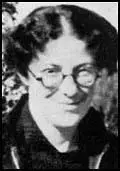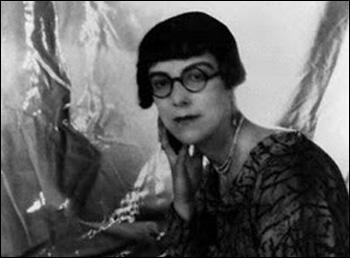Sylvia Townsend Warner

Sylvia Townsend Warner, the daughter of George Townsend Warner, a Harrow School history master, was born on 6th December, 1893. Educated at home she worked in a munitions factory during the First World War.
Nancy Cunard introduced Warner to Mary Valentine Ackland and the two women lived together for the rest of their lives. Warner's first novel, Lolly Willowes, was published in 1926. This was followed by the novels Mr. Fortune's Maggot (1927) and The True Heart (1929).
Warner was the co-editor of the 10-volume Tudor Church Music (1923-29). Warner also wrote poetry and in 1933 published Whether A Dove or Seagull with Ackland. A regular contributor to New Yorker, Warner's poetry was praised by Alfred Edward Housman and William Butler Yeats and Louis Untermeyer compared her to Thomas Hardy.
Warner, was a leading member of the Communist Party of Great Britain in Dorset. She also gave support to the Spanish Medical Aid Committee, an organization that had been set-up by the Socialist Medical Association and other progressive groups. Other members included Leah Manning, Isabel Brown, George Jeger, Lord Faringdon, Arthur Greenwood, Tom Mann, Ben Tillett, Harry Pollitt, Hugh O'Donnell, Mary Redfern Davies and Isobel Brown. Soon afterwards Kenneth Sinclair Loutit was appointed Administrator of the Field Unit that was to be sent to Spain.
In September 1936 Warner and Mary Valentine Acklandwent to Spain and provided help to the British Medical Aid Committee supporting the Republican Army. They were inspired by the revolutionary atmosphere they found in Barcelona. Warner wrote: "I don't think I have ever met so many congenial people in the whole of my life." However, the two women wrote a letter of complaint to Harry Pollitt about the "failure to adopt a satisfactory social attitude" by some members of the Communist Party of Great Britain.
However, Warner and Ackland went along with the Communist Party (PCE) repression of Worker's Party (POUM) in Barcelona. In The Daily Worker Ackland argued that the action had been justified because of "POUM's utopian non-authoritarian politics spelled certain death to the Republic pitched against the military strength of the Fascist powers."

On her return to Dorset Warner wrote an article for The Left Review about the way the Catholic Church oppressed the Spanish people. In a letter to her friend Elizabeth Wade she made the same point: "I have never seen churches so heavy and hulking and bullying, one can see at a glance that they have always been reactionary fortresses. I did not find a single person of any class who resented their being gutted, though we did find two domestic servants... who felt a certain uneasiness about it, as though God might pop out of those ruined choirs and grab them by the scruff. The not being able to read and write is the crux. A people naturally intellectual, and with a long standard of culture, have thrown off the taskmasters who enforced ignorance on them."
As Angela Jackson pointed out in British Women and the Spanish Civil War (2002): "They (Ackland and Warner) were involved in the founding of the local Left Book Club and Sylvia was secretary of the Dorset Peace Council. They were ardently committed to the cause of the Spanish Republic, campaigning and fund-raising in a whirl of breathless non-stop activity."
The following year the two women went to Madrid and Valencia as part of the British delegation to the Second Congress of the International Association of Writers for the Defence of Culture. Twenty-six countries participated in the conference. Warner wrote about it in an article published in Time and Tide in August 1937: "We learned to hear ourselves spoken of as los intelectuales without dreading words usually so dubious in good intent, without feeling the usual embarrassment and defiant shrinking."
Other novels by Warner include Summer Will Show (1936), After the Death of Don Juan (1938), The Corner That Held Them (1948) and The Flint Anchor (1954). During her career Warner published seven novels, ten volumes of short stories, five volumes of poetry and a biography of T. H. White.
Warner eventually left the Communist Party of Great Britain. The historian, Angela Jackson, argues: "Sylvia Townsend Warner allowed her membership of the Party to lapse during the 1950s. Along with other writers on the Left, she became a literary casualty of the Cold War." When she was asked why she had ceased to be active in politics: "We had fought, we had retreated, we were betrayed and now we were misrepresented."
Sylvia Townsend Warner died on 1st May 1978.
Primary Sources
(1) Sylvia Townsend Warner, letter to Elizabeth Wade (14th November, 1936)
I have never seen churches so heavy and hulking and bullying, one can see at a glance that they have always been reactionary fortresses. I did not find a single person of any class who resented their being gutted, though we did find two domestic servants... who felt a certain uneasiness about it, as though God might pop out of those ruined choirs and grab them by the scruff. The not being able to read and write is the crux. A people naturally intellectual, and with a long standard of culture, have thrown off the taskmasters who enforced ignorance on them.
(2) James Hopkins, Into the Heart of the Fire: The British in the Spanish Civil War (1998)
The writers Sylvia Townsend Warner and Valentine Ackland, whom Spender mercilessly caricatured while he was travelling with them in Spain," are sometimes seen as just another example of left-wing "day trippers." Sylvia Townsend Warner had already demonstrated, however, a genuine degree of political seriousness by taking part in the East End demonstrations against Mosley and the Fascists. In addition, her novels showed increasing commitment to society's marginalized. In Lolly Willowes: or the Loving Huntsman, which was published in 1926, her heroine, a forty-year-old unmarried woman, abandons her upper-middle-class existence to live with the poor in a Chiltern village. Summer Will Show, a historical novel published on the eve of the Spanish War, offered hope that communism would prove to be the new form of economic and social organization that would eliminate classes and ensure a sufficiency for all." Her Spanish Civil War novel, After the Death of Don juan, has been rediscovered and much praised.," Moreover, both she and her partner wrote widely on antifascist issues, most significantly in the Left Review.
What further separated Townsend Warner and Ackland from the run of dilettantes is that they were both dedicated communists who had been asked to come to Spain by Tom Wintringham, an old friend, to do administrative work for the medical units. When they arrived in Barcelona, they were both dismayed and uplifted by the dizzying whirl of events. They wrote a letter to Pollitt complaining that Wintringham was too preoccupied with his journalistic duties, and the party, consequently, was badly disorganized. The city itself, however, captivated Sylvia. "Barcelona, by the time we saw it, was I suppose the nearest thing I shall ever see to the early days of (the) USSR." Having made their report to Pollitt, they believed their duty done, and promptly returned to England. Valentine was offered an opportunity to drive an ambulance back to Spain, which she quickly accepted, but illness prevented her from doing it." The two, however, returned to Spain in July 1937 to attend the International Writers' Conference.
(3) Sylvia Townsend Warner, The Countryman (October 1937)
It is unusual for writers to hear such words as 'Here come the Intellectuals' spoken by working-class people and common soldiers in tones of kindliness and enthusiasm. And it was a new experience to see a harvest being reaped with sickles, and trodden out upon threshing-floors.
This harvest on the long plain east of Madrid is significant in many ways. While the strange workings of Non-Intervention impede even foodstuffs from reaching that part of Spain which is loyal to the government, every ear of corn is important. I was told a story about this, while we sat quenching our midday thirst in the inn of Utiel, sitting in a large, bare, half-darkened room, while, silhouetted against the blazing light of the open doorway, the children of the town came in, at first shyly, then confidently, to walk exploringly around us, murmuring to each other those words we had already learned not to flinch at, 'These are the Intellectuals.' It was a writer who told me the story, Jef Last. But he spoke as a soldier, for he has been fighting since the outbreak of the Franco revolt. This year, he said, the corn had ripened early. His regiment was holding a section of the line which runs through cornfields. The men, very many of them peasants, watched the corn with interest; presently, with passionate concern. For it was ready to reap, and in these acres dominated by war there was no one to reap it. They watched the corn as patriots, too, knowing the important of the harvest. They held a meeting, and decided that they themselves would reap it. Sickles were got and the corn behind the lines was reaped and stocked. But there was corn in front as well, in no man's land. Crawling out on their bellies, under threat of fire always and often under fire, working in the time allotted to them for rest, they reaped the no man's land corn also. Between them and the enemy was an array of neat stocks. But who was to carry it? Each soldier is equipped with a blanket, and they carried the corn in their blankets, carrying the treasure back behind the lines to where common life began again, to where the mules trudged on the threshing-floor and the barns could store the harvest.


